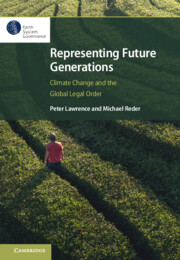Part I - Normative Framework
Justifying Representation of Future Generations
Published online by Cambridge University Press: 19 September 2025
Information
- Type
- Chapter
- Information
- Representing Future GenerationsClimate Change and the Global Legal Order, pp. 21 - 90Publisher: Cambridge University PressPrint publication year: 2025
